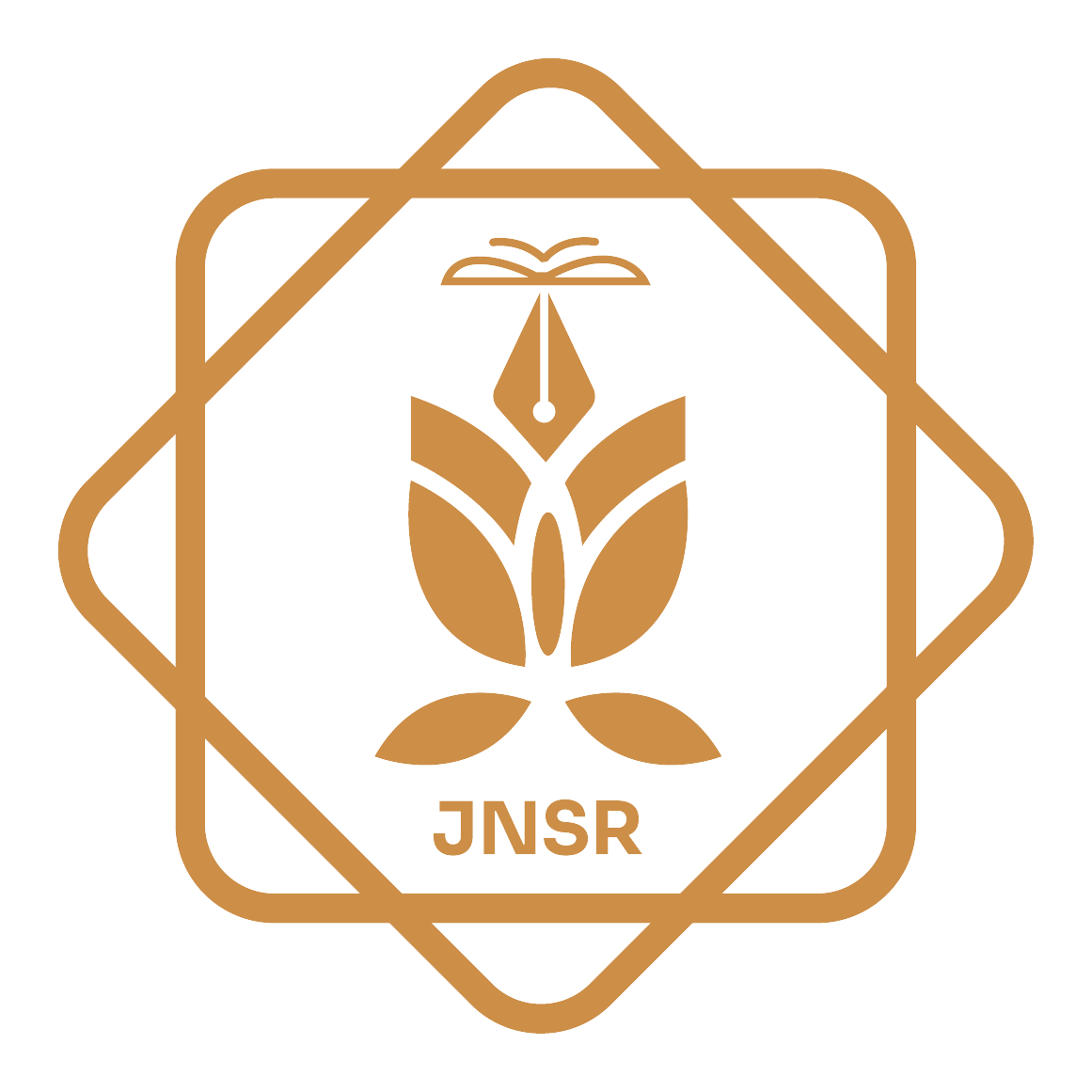Natural Radioactivity Levels in Groundwater Sources and Their Health Impact Assessment on the Consumers
DOI:
https://doi.org/10.62810/jnsr.v3i3.265Keywords:
Carcinogenic, Contamination, Drinkable, Radiation, Radionuclides, ToxicityAbstract
Groundwater is one of the significant sources of drinkable water in our society today. Groundwater samples were collected from various locations and then prepared for a coaxial high-purity germanium (HPGe) detector for analysis. These studies measured the activity of 232-Th, 226-Ra, and 40-K in groundwater sources; then estimated the total annual effective radiation dose in groundwater and the lifetime cancer risk to the populace. The results show that the mean activity of 40-K from Egbeda, Ipaja, and Ije Ododo is 2.534, 1.713, and 1.931 Bq/l, respectively. These values were higher than the mean activity of 232-Th, which was 0.342, 0.364, and 0.402 Bq/l for Egbeda, Ipaja, and Ije Ododo, respectively. The mean activity of 226-Ra from Egbeda, Ipaja, and Ije Ododo is 1.191, 0.735, and 0.490 Bq/l, respectively. Hence, the mean total effective doses from Ipaja are 0.218 μSv/year for adults, 0.246 μSv/year for children, and 0.219 μSv/year for infants. In adults, the annual effective radiation doses were highest in EG1, with a value of 0.429 μSv/year, and EG4 had a value of 0.455 μSv/year. PA4 had a value of 0.344 μSv/year, and the lowest was recorded from JE3, with a value of 0.076 μSv/year. The obtained values were lower in Ipaja and Ije Ododo; this may not pose any significant health problems. Samples from Egbeda show significantly higher values of annual effective dose and may pose health problems for the consumers in the long term due to bioaccumulation
Downloads
References
Abbady, A. G. (2004). Estimation of Radiation Hazard Indices from Sedimentary Rocks in Upper Egypt. Applied Radiation and Isotopes, 60, 111-114. https://doi.org/10.1016/j.apradiso.2003.09.012 DOI: https://doi.org/10.1016/j.apradiso.2003.09.012
Abd El Mageed A.I, El Hadi El Kamel A, Abd El Bast A, Harb S, Saleh I.I. (2013) Natural radioactivity of ground and hot spring water in some areas in Yemen. Desalination, 321:28-31. https://doi.org/10.1016/j.desal.2011.11.022 DOI: https://doi.org/10.1016/j.desal.2011.11.022
Abojassim A.A, Bakir H.A.A, Zbalh M.A, Al-Ruwaishidi B.A (2017) Using SSNTD technique to assess radon flux density in liquid cleaning materials samples available in Iraqi pharmacies and markets. Research Journal of Pharmacy and Technology, 10(8):1-5. DOI: 10.5958/0974-360X.2017.00434.6 DOI: https://doi.org/10.5958/0974-360X.2017.00434.6
Ahmed N.K. (2004) Natural radioactivity of ground and drinking water in some areas of Upper Egypt. Turk J Eng Environ Sci , 28:345 54
El Mageed A. I, El Kamel A. H, Abbady A, Harb S, Youssef A. M, Saleh I.I. (2010) Assessment of natural and anthropogenic radioactivity levels in rocks and soil in the environments of Juban Town in Yemen. Radiat Phys Chem, 80:710 5. DOI:10.1016/j.radphyschem.2011.02.025 DOI: https://doi.org/10.1016/j.radphyschem.2011.02.025
Gascoyne M. (1989) High levels of uranium and radium in groundwater at Canada’s underground. Appl. Geochem, 4:557 91 doi.org/10.1051/radiopro/2010056 DOI: https://doi.org/10.1016/0883-2927(89)90068-1
Godoy J.M, Godoy M.L.(2006). Natural radioactivity in Brazilian groundwater. J Environ Radioact;85:71 83. doi: 10.1016/j.jenvrad.2005.05.009 DOI: https://doi.org/10.1016/j.jenvrad.2005.05.009
Harb S., El Kamel A.H, Zahran A. M, Abbady A. A, Ahmed F.A.(2013) Natural radioactivity of ground water in some areas in Aden governorate South of Yemen Region Radiation Protection and Environment, Vol 36 Issue 3. DOI: 10.4103/0972-0464.137476
IAEA (1996). International Basic Safety Standards for Protection against Ionizing Radiation and for the Safety of Radiation Sources. Safety Series 15. Vienna.www-ns.iaea.org/standards/
IAEA (2002). Specification of Radionuclide Content in Commodities Requiring Regulation for Purposes of Radiation Protection Safety. Guide (Draft). Vienna
ICRP,(1996). Age dependent doses to members of the public from intake of radionuclides: Part 5 Compilation of ingestion and inhalation dose coefficients. Annals of the ICRP. Vol. 26, No. 1. Oxford: ICRP Publication 72,Pergamon Press. DOI: https://doi.org/10.1016/S0146-6453(00)89192-7
ICRP, 2008. The 2007 recommendations of the International Commission on Radiological Protection,ICRP Publication 103. Annals of the ICRP, 37(2–4).
International Atomic Energy Agency (2004). Annual report reviews to the general conference.
International Atomic Energy Agency (2004) Extent of environmental contamination by naturally occurring radioactive material (NORM) and technological options for mitigation. International Atomic Energy Agency
International Atomic Energy Agency (2014). The Environmental Behavior of Radium: Revised Edition. Technical Report Series n. 476
Isam Salih M.M, Pettersson H.B, Lund E. (2002). Uranium and thorium series radionuclides in drinking water from drilled bedrock wells: Correlation to geology and bedrock radioactivity and dose estimation. Radiat Prot Dosimetry, 102:249 58.
doi: 10.1093/oxfordjournals.rpd.a006093 DOI: https://doi.org/10.1093/oxfordjournals.rpd.a006093
Lagos Map; (2022) https://www.wefinder24.com/2022/07/most-populated-local-government-area in.html https://fluswikien.hfwu.de/images/1/15/LAGOS_STATE_MAP.jpg
Osman A.A, Salih I, Shaddad I.A, El Din S, Siddeeg M.B, Eltayeb H, et al. (2008) Investigation of natural radioactivity levels in water around Kadugli, Sudan. Appl Radiat Isot, 66:1650 3 DOI: 10.1016/j.apradiso.2007.06.014 DOI: https://doi.org/10.1016/j.apradiso.2007.06.014
Petitti D.B, Crooks V.C, Buckwalter J.G, Chiu V. (2005) Blood pressure levels before dementia. Arch Neurol., 62(1):112-6, DOI: 10.1001/archneur.62.1.112 DOI: https://doi.org/10.1001/archneur.62.1.112
Pujol .L, and Sanchez-Cabeza J. A (2000). Natural and artificial radioactivity in surface waters of the Ebro river basin (Northeast Spain). Journal of Environmental Radioactivity, 51(2): 181-210. https://doi.org/10.1016/S0265-931X(00)00076-X DOI: https://doi.org/10.1016/S0265-931X(00)00076-X
Salonen L. (1994). 238U series radionuclides as a source of increased radioactivity in Groundwater originating from finish bedrock. In: Soukko J, editor. Future Groundwater Resources at Risk, IAHS Publication No. 222. Oxfordshire:IAHS Press, p. 71 84. ISBN, 0947571280
Seiler, R.L., and Wiemels, J.L., (2012). Occurrence of 210-Po and biological effects of low-level exposure: The need for research: Environmental Health Perspectives, vol. 120, no. 9, p. 1230-1237. doi: 10.1289/ehp.1104607 DOI: https://doi.org/10.1289/ehp.1104607
Sgorbati G, Forte M.(1997). Determination of 238U and 226Ra concentrations in drinking waters in Lombaradia Region, Italy, Communication to UNSCEAR Secretariat DOI: 10.4103/0972-0464.137476 DOI: https://doi.org/10.4103/0972-0464.137476
Shaban M .M and Shady I. H (2016), Risk assessment of radionuclides and heavy metals in ground water in selected water wells in Northwestern of Egypt. International journal of advanced research http://dx.doi.org/10.21474/IJAR01/2079 DOI: https://doi.org/10.21474/IJAR01/2079
Soto, J., Quindos, L. S., Díaz-Caneja, N., Gutierrez, I., & Fernandez, P. L. (1988). 226Ra and 222Rn in Natural Waters in Two Typical Locations in Spain. Radiation Protection Dosimetry, 24, 109–111. https://doi.org/10.1093/OXFORDJOURNALS.RPD.A080252 DOI: https://doi.org/10.1093/rpd/24.1-4.109
Tawalbeh, A. A., Samat, S. B., Yasir, M. S., & Omar, M. (2012). Radiological impact of drinks intakes of naturally occurring radionuclides on adults of central zone of Malaysia. The Malaysian Journal of Analytical Sciences, 16 (2), 187–193.Link
U.S. Environmental Protection Agency. (2000). National water quality inventory: 2000 report (EPA 841-R-02-001). U.S. Environmental Protection Agency. Link
U.S. Environmental Protection Agency. (2005). Guidelines for carcinogen risk assessment. U.S. Environmental Protection Agency, Risk Assessment Forum. Link
World Health Organization. (2003). Guidelines for drinking-water quality (3rd ed.). World Health Organization. Link
World Health Organization. (2017). Guidelines for drinking-water quality: Fourth edition incorporating the first addendum (4th ed.). World Health Organization. Link
World Health Organization. (2011). Guidelines for drinking-water quality (4th ed.) Link
Zhuo, W., Iida, T., & Yang, X. (2001). Occurrence of [specific radionuclides] and U in groundwater in Fujian Province, China. Journal of Environmental Radioactivity, 53(1), 111–120. https://doi.org/10.1016/S0265-931X(00)00108-9 DOI: https://doi.org/10.1016/S0265-931X(00)00108-9
Downloads
Published
How to Cite
Issue
Section
License
Copyright (c) 2025 Kayode Ogungbemi

This work is licensed under a Creative Commons Attribution-NonCommercial 4.0 International License.

























